教老外汉语20个简单的句子
- 格式:pdf
- 大小:612.26 KB
- 文档页数:76
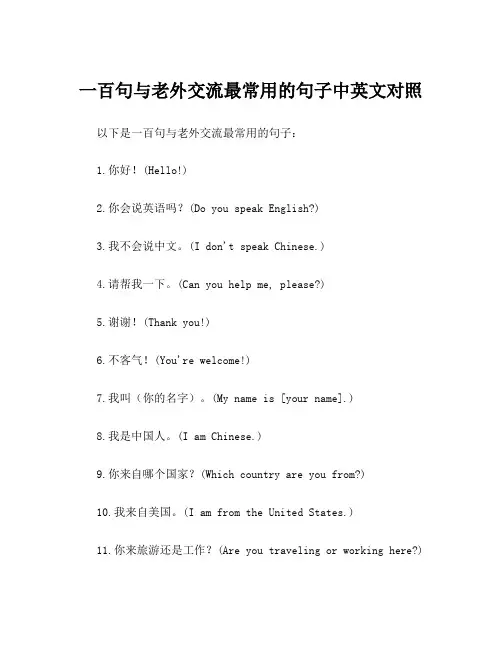
一百句与老外交流最常用的句子中英文对照以下是一百句与老外交流最常用的句子:1.你好!(Hello!)2.你会说英语吗?(Do you speak English?)3.我不会说中文。
(I don't speak Chinese.)4.请帮我一下。
(Can you help me, please?)5.谢谢!(Thank you!)6.不客气!(You're welcome!)7.我叫(你的名字)。
(My name is [your name].)8.我是中国人。
(I am Chinese.)9.你来自哪个国家?(Which country are you from?)10.我来自美国。
(I am from the United States.)11.你来旅游还是工作?(Are you traveling or working here?)12.我在这里工作。
(I am working here.)13.你喜欢中国的文化吗?(Do you like Chinese culture?)14.是的,我很喜欢。
(Yes, I really like it.)15.请问,这附近有好的餐厅吗?(Excuse me, are there any good restaurants nearby?)16.你有什么推荐?(Do you have any recommendations?)17.这里有什么好玩的地方?(What are some fun places to visit here?)18.我可以去哪里购物?(Where can I go shopping?)19.请告诉我怎么去(地点)。
(Please tell me how to get to [location].)20.麻烦给我一个地图。
(Could you give me a map, please?)21.我迷路了。
(I'm lost.)22.对不起,我听不懂。
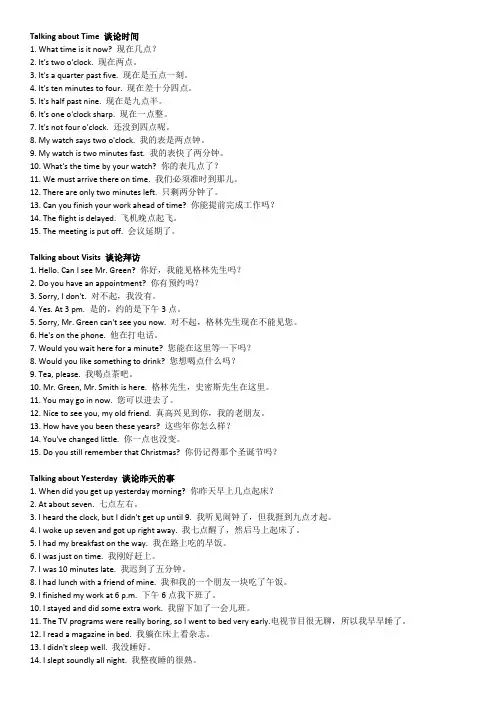
Talking about Time 谈论时间1. What time is it now? 现在几点?2. It's two o'clock. 现在两点。
3. It's a quarter past five. 现在是五点一刻。
4. It's ten minutes to four. 现在差十分四点。
5. It's half past nine. 现在是九点半。
6. It's one o'clock sharp. 现在一点整。
7. It's not four o'clock. 还没到四点呢。
8. My watch says two o'clock. 我的表是两点钟。
9. My watch is two minutes fast. 我的表快了两分钟。
10. What's the time by your watch? 你的表几点了?11. We must arrive there on time. 我们必须准时到那儿。
12. There are only two minutes left. 只剩两分钟了。
13. Can you finish your work ahead of time? 你能提前完成工作吗?14. The flight is delayed. 飞机晚点起飞。
15. The meeting is put off. 会议延期了。
Talking about Visits 谈论拜访1. Hello. Can I see Mr. Green? 你好,我能见格林先生吗?2. Do you have an appointment? 你有预约吗?3. Sorry, I don't. 对不起,我没有。
4. Yes. At 3 pm. 是的,约的是下午3点。
5. Sorry, Mr. Green can't see you now. 对不起,格林先生现在不能见您。
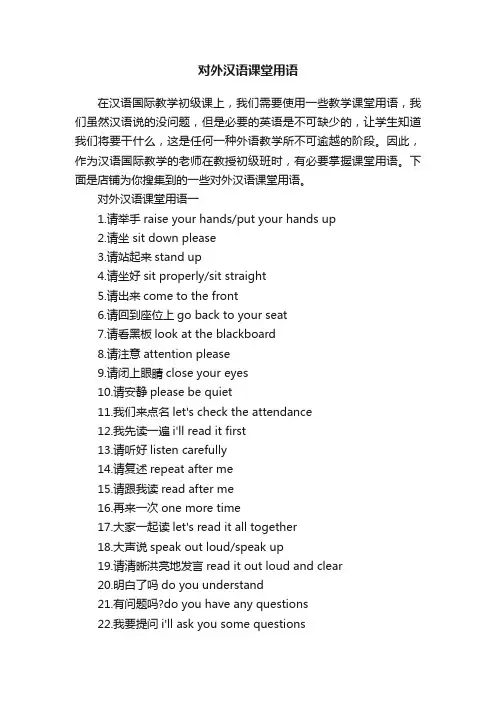
对外汉语课堂用语在汉语国际教学初级课上,我们需要使用一些教学课堂用语,我们虽然汉语说的没问题,但是必要的英语是不可缺少的,让学生知道我们将要干什么,这是任何一种外语教学所不可逾越的阶段。
因此,作为汉语国际教学的老师在教授初级班时,有必要掌握课堂用语。
下面是店铺为你搜集到的一些对外汉语课堂用语。
对外汉语课堂用语一1.请举手raise your hands/put your hands up2.请坐 sit down please3.请站起来stand up4.请坐好sit properly/sit straight5.请出来come to the front6.请回到座位上go back to your seat7.请看黑板look at the blackboard8.请注意attention please9.请闭上眼睛close your eyes10.请安静please be quiet11.我们来点名let's check the attendance12.我先读一遍i'll read it first13.请听好listen carefully14.请复述repeat after me15.请跟我读read after me16.再来一次one more time17.大家一起读let's read it all together18.大声说speak out loud/speak up19.请清晰洪亮地发言read it out loud and clear20.明白了吗do you understand21.有问题吗?do you have any questions22.我要提问i'll ask you some questions23.请回答问题please answer the questions24.你能来回答一下吗can you answer it25.你说什么what did you say26.你能再说一遍吗could you say it again27.给大家发补充材料i'll give you a handout28.请传给后座同学please pass it to the person behind you29.请在补充材料上写上名字write your name on your handout30.请传给我bring it to me31.请翻到第15页open your books to page1532.请翻到下一页turn to the next page33.请合上书close your books34.请记到笔记本上write it on your notebook35.请到黑板上写一下come and write it on the blackboard36.请在下面画横线underline it37.请找伙伴please get in pairs38.请做练习题do the exercise39.请与同伴一起做练习practice with your partners40.请与同伴交流talk with your partners41.都做完了吗have you finished42.我们来复习上节课的内容let's review the last lesson43.上节课我们做什么了what did we do last time44.让我们来对答案let's check the answers45.我来布置作业i'll give you some homework46.不要忘了做作业don't forget to do your homework47.我要检查作业i'll check your homework now48.请使用汉语please speak in chinese49.那个用汉语怎么说what is it in chinese50.让我们来进行下一个活动let's go on to the next activity51.今天就到这里that's all for today。

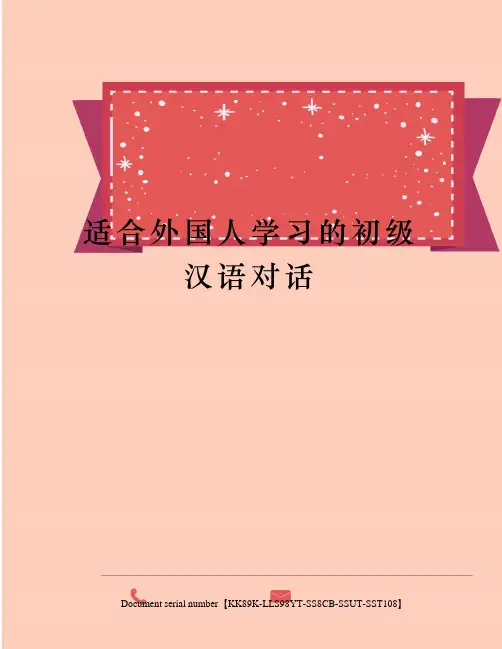
适合外国人学习的初级汉语对话Document serial number【KK89K-LLS98YT-SS8CB-SSUT-SST108】第三课1.我要去商店买东西。
Woyaoqushangdianmaidongxi.2.你会做菜吗你最拿手的菜是什么3.NihuizuocaimaNizuinashoudecaishishenme4.你早上几点起床晚上几点睡觉5. NizaoshangjidianqichuangWanshangjidianshuijiao6.你周末要去哪里和谁一起去7.NizhoumoyaoqunaliHesheiyiqiqu8.你要买什么水果要买几斤9.NiyaomaishenmeshuiguoYaomaijijin10.你现在住在哪里离我们家远吗11.NixianzaizhuzainaliLiwomenjiayuanma12.明天会下雨吗?Mingtianhuixiayuma?13.我很喜欢这双鞋,我可以试一试吗?Wohenxihuanzheshuangxie,wokeyishiyishima?14.你有没有吃过大学城的小吃好吃吗15. NiyoumeiyouchiguodaxuechengdexiaochiHaochima16.北京烤鸭很有名,我们应该去尝一尝。
Beijingkaoyahenyouming,womenyinggaiquchangyichang.17.明天下午去王兰的家吧,好吗?Mingtianxiawuquwanglandejiaba,haoma?18.天气很热,我想吃一个冰淇淋。
Tianqihenre,woxiangchiyigebingqilin.19.你吃饱了吗?Nichibaolema?。
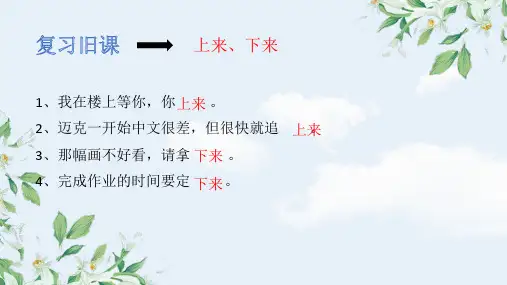
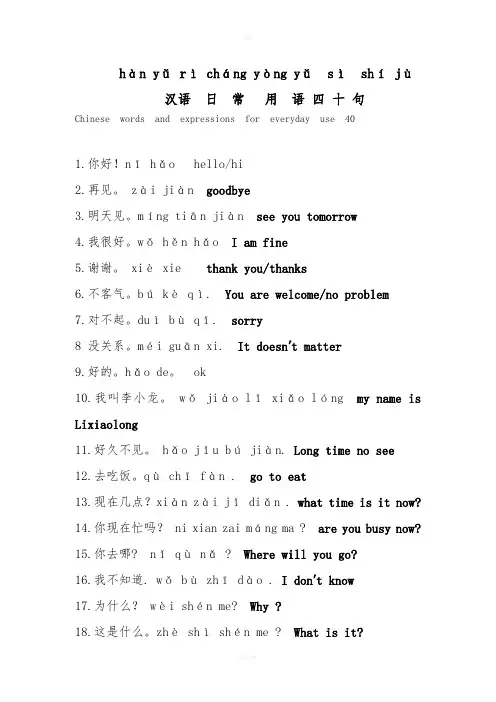
hàn yǔ rì cháng yòng yǔ sì shí jù汉语日常用语四十句Chinese words and expressions for everyday use 401.你好!nǐ hǎo hello/hi2.再见。
zài jiàn goodbye3.明天见。
míng tiān jiàn see you tomorrow4.我很好。
wǒ hěn hǎo I am fine5.谢谢。
xiè xie thank you/thanks6.不客气。
bú kè qì. You are welcome/no problem7.对不起。
duì bù qǐ. sorry8 没关系。
méi guān xi. It doesn’t matter9.好的。
hǎo de。
ok10.我叫李小龙。
wǒ jiào lǐ xiǎo lóng my name is Lixiaolong11.好久不见。
hǎo jǐu bú jiàn. Long time no see12.去吃饭。
qù chī fàn . go to eat13.现在几点?xiàn zài jǐ diǎn . what time is it now?14.你现在忙吗? ni xian zai máng ma ? are you busy now?15.你去哪? nǐ qù nǎ ? Where will you go?16.我不知道. wǒ bù zhī dào . I don’t know17.为什么? wèi shén me? Why ?18.这是什么。
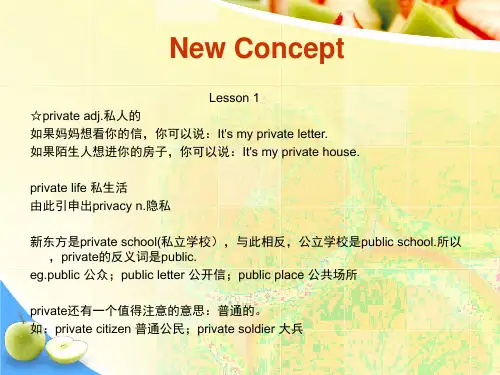
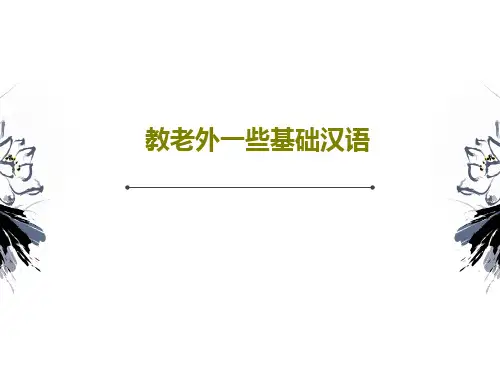

老外学汉语四十句.doc 老外学汉语四十句1. 你好!(nǐ hǎo) - Hello!2. 谢谢!(xiè xiè) - Thank you!3. 对不起。
(duì bù qǐ) - Sorry。
4. 没关系。
(méi guān xi) - It's okay。
5. 我叫.(wǒ jiào.) - My name is。
6. 你叫什么名字?(nǐ jiào shén me míng zì) - What's your name?7. 请问.(qǐng wèn.) - Excuse me, may I ask。
8. 你会说英语吗?(nǐ huì shuō yīng yǔ ma) - Do you speak English?9. 我不会说中文。
(wǒ bú huì shuō zhōng wén) - I don't speak Chinese。
10. 你能帮助我吗?(nǐ néng bāng zhù wǒ ma) - Can you help me?11. 我迷路了。
(wǒ mí lù le) - I'm lost。
12. 我想去.(wǒ xiǎng qù.) - I would like to go to。
13. 这个多少钱?(zhè ge duō shǎo qián) - How much is this?14. 我喜欢中国的食物。
(wǒ xǐ huān zhōng guó de shí wù) - I like Chinese food。
15. 你有什么建议吗?(nǐ yǒu shén me jiàn yì ma) - Do you have any suggestions?16. 我很高兴认识你。
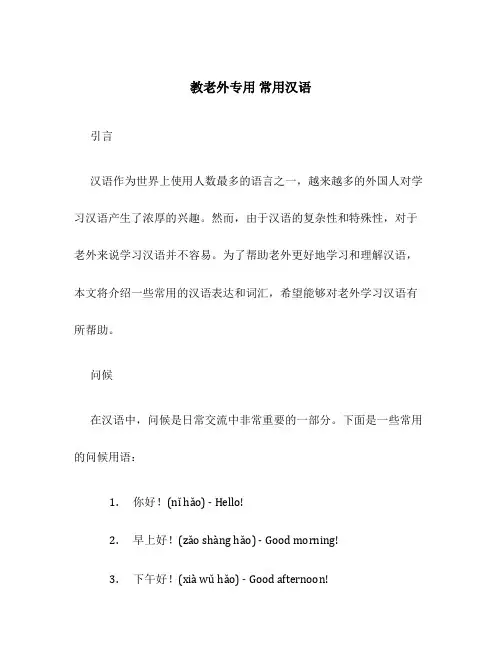
教老外专用常用汉语引言汉语作为世界上使用人数最多的语言之一,越来越多的外国人对学习汉语产生了浓厚的兴趣。
然而,由于汉语的复杂性和特殊性,对于老外来说学习汉语并不容易。
为了帮助老外更好地学习和理解汉语,本文将介绍一些常用的汉语表达和词汇,希望能够对老外学习汉语有所帮助。
问候在汉语中,问候是日常交流中非常重要的一部分。
下面是一些常用的问候用语:1.你好!(nǐ hǎo) - Hello!2.早上好!(zǎo shàng hǎo) - Good morning!3.下午好!(xià wǔ hǎo) - Good afternoon!4.晚上好!(wǎn shàng hǎo) - Good evening!5.你吃了吗?(nǐ chī le ma) - Have you eaten?6.最近怎么样?(zuì jìn zěn me yàng) - How have you been lately?入门如果你刚开始学习汉语,下面是一些常见的入门词汇和表达:1.谢谢!(xiè xiè) - Thank you!2.对不起!(duì bù qǐ) - I’m sorry!3.没关系!(méi guān xi) - It’s okay!4.是的。
(shì de) - Yes.5.不是。
(bú shì) - No.6.可能。
(kě néng) - Maybe.交通和定位当外国人在中国旅行或生活时,他们需要学会一些与交通和定位有关的词汇和表达:1.地铁站(dì tiě zhàn) - Subway station2.公交车站(gōng jiāo chē zhàn) - Bus stop3.出租车(c hū zū chē) - Taxi4.请问去…(qǐng wèn qù…) - Excuse me, how can I get to…5.左转(zuǒ zhuǎn) - Turn left6.右转(yòu zhuǎn) - Turn right7.直走(zhí zǒu) - Go straight生活用语在日常生活中,我们使用一些常见的汉语表达来描述我们的需求和感受。
200 Frequently Used Chinese Sentences 1.为什么呢?wèi shén me ne How come?3.放手! fàng shǒu Let go!4.我也是。
wǒ yě shì Me too.5.天呀! tiān ya My goodness!6.不行! bù xíng No way!7.来吧! lái ba Come on.8.等一等。
děng yi děng Hold on.9.我同意。
wǒ tóng yì I agree.10.还不错。
hái bú cuò Not bad.11.还没。
hái méi Not yet.12.再见。
zài jiàn See you.13.闭嘴! bì zuǐ Shut up!14.好呀! hǎo ya Great!15.为什么不呢? wéi shén me bù ne Why not?16.让我来。
ràng wǒ lái Allow me.17.安静点! ān jìng diǎn Be quiet!18.振作起来! zhèn zuò qǐ lái Cheer up!19.做得好! zuò de hǎo Good job!21.祝你玩得开心! zhù nǐ wán de kāi xīn Enjoy yourself!22.我饱了。
wǒ bǎo le I'm full.23.我回来了。
wǒ huí lái le I'm home.24.我迷路了。
wǒ mí lù le I'm lost.25.我请客。
叫外国人中文简单句子
中文是一种具有悠久历史的语言,许多外国人都渴望学习这种美丽的语言。
在这篇文章中,我将向外国人介绍一些简单的中文句子,以帮助他们学习中文,提高自己的语言能力。
首先,我们可以介绍一些有关“问候”的中文句子。
“你好”是一句比较熟悉的中文,意思是“Hello”或“Hi”,它被广泛使用,是人们的日常用语。
“再见”是表示“Goodbye”的一句中文,而“晚安”则是问候他人安睡的句子。
其次,让我们来看看“自我介绍”的中文句子。
“我叫XXX”是一句比较常用的中文,它可以用来表示自己的名字,“我来自XXXX”是一句表示自己来自哪里的句子,而“我是XXX”则是介绍自己的职业或身份。
再次,我们可以介绍一些有关“询问”的中文句子。
“你叫什么名字?”是一句常用的中文,它可以用来询问别人的名字,而“你是什么职业?”则是询问别人的工作的句子,而“你今年多大了?”就是一句问别人的年龄的话。
最后,让我们来看看一些有关“表达感谢”的中文句子。
“谢谢你!”是一句比较常用的中文,它可以用来表达对他人所做的一切感激之情,而“太感谢你了!”则是表达更深的感激之情。
以上就是本文所介绍的一些简单的中文句子,可以帮助外国人学习中文,从而提高他们的口语能力。
希望外国人能够认真学习中文,学会使用这些句子,享受学习中文的快乐。
实用汉语口语表达(2)(外国人在中国生活必备常用句子)汉语初级入门课程(中英翻译)1. 怎么了?Zěnme le?What's the matter?2. 你别再吸烟了。
Nǐ bié zài xī yān le.Don't smoke any more.3. 我很想家。
Wǒ hěn xiǎng jiā.I miss my family members very much.4. 你每天几点上班?Nǐ měitiān jǐ diǎn shàng bān?What time do you start every day?5. 你每天几点下班?Nǐ měitiān jǐ diǎn xià bān?What time do you get off every day?6. 你以前做过什么工作?Nǐ yǐqián zuòguo shénme gōngzuò? What kind of jobs did you have before?7. 你在这里工作多长时间了?Nǐ zài zhèli gōngzuò duō cháng shíjiān le? How long have you been working here?8. 你最近忙吗?Nǐ zuìjìn máng ma?Are you busy these days?9. 你的爱好是什么?Nǐ de àihào shì shénme?What are your hobbies?10. 我喜欢看书。
Wǒ xǐhuan kàn shū.I like reading.11. 周末你一般干什么?Zhōumò nǐ yìbān gàn shénme?What do you usually do on weekends?12. 你想吃什么?Nǐ xiǎng chī shénme?What would you like to eat?13. 我要一个汉堡,还有一杯红茶。
Savvy Chat Chinese – 20 Questions to Basic Fluency20 Questions to Basic Fluency:Guide to Basic Conversational Mandarinby Matt SikoraFirst Edition, 2012Editor: Seraph ChingContact Information:/profile/mtskahttps:///u/0/117895081310002069781/about/pub/matthew-sikora/a/473/a35Savvy Chat Chinese: 20 Questions to Basic Fluency by Matt Sikora is licensed under the Creative Commons Attribution 3.0 Unported License. To view a copy of this license, visit /licenses/by/3.0/ or send a letter to Creative Commons, 444 Castro Street, Suite 900, Mountain View, California, 94041, USA.Savvy Chat Chinese – 20 Questions to Basic FluencyHow to use this bookConversation is the heart of language learning. Talking with someone in another languagedevelops your listening skills while giving you the speaking practice that you need. Butconversing in another language can be hard to manage when you are first starting out. Savvy Chat Chinese – 20 Questions to Basic Fluency is homebase for developing your MandarinChinese communication skills. It is not only a guide for you, but it is also a guide for yourlanguage partner. Conversation is all about improvising within the linguistic and cultural rules of the language. This book allows you improvise with a manageable number of high frequency questions and answer and it gives your language partner a guide as to how to help you so that you can both make the most of your time. Below are some suggestions on how to use Savvy Chat Chinese – 20 Questions to Basic Fluency:1. Read the book – Read the book all the way through. It gives you a unique perspective on thegrammar at work behind the patterns and characters used in the questions and answers.2. Personalize the book – Take some time to personalize the questions and answers in this bookwith your own information. If someone asks you one of these questions it is important for you to be able to come up with a response with your own information. Write out your answers (or your likely answers) to each of the 20 questions and keep that list handy.3. Chat – Whether you are face to face or texting - communicating with real people is still thebest way to learn a language. You need to use the questions and answers in this book as often as you can. You don’t need to be perfect. In fact, you absolutely have to make mistakes in order to learn languages. No one, native speaker or foreigner, young or old, has ever learned Mandarin without going through the same thing that you are going through right now. If you have alanguage partner, let the person know that you are focusing on these 20 questions and answers and give the person a copy of them so he or she can help you. You will be able to make the most of your time if both of you are using these questions and answers in your conversations.Enriching your studiesThe fastest way to learn Mandarin is to go live where Mandarin is spoken for a year or more. Be sure to only use Mandarin and stay away from anyone that speaks to you in any other language. If you are in a position in your life to do this, stop reading right now and get going. You won’t regret it.But chances are that your learning experience has been and will be a bit more fragmented than what was described above. This book is great for learning how to start communicating with people in Mandarin, but it is not enough. You need to immerse yourself in the language as much as you can and no book can ever take the place of living your life in the Chinese language and culture. There are two simple rules for learning languages that you should try to keep in mind:1. There is no substitute for repetition.2. Never let yourself get bored.You can’t possibly use the 20 questions and answers in this book too much. They make up the basis of daily conversation and even after you have mastered them you will still use them all the time. But if the only thing you do is use these 20 questions and answers you’ll probably become bored with it and lose your motivation before you master them. Be sure to seek out things that interest you and allow yourself to get distracted every so often. Follow your bliss and you’ll be a much happier Mandarin learner. Come back to the 20 Questions to Basic Fluency whenever you need them, but don’t put on the blinders to what else is out there. Happy chatting!BackgroundSavvy Chat Chinese – 20 Questions to Basic Fluency was developed and written as a communication guide for Mandarin language learners who are ready to put their language skills to use. The questions cover some of the most high frequency grammar patterns, vocabulary andcommunication situations that you will need to know at the basic level. This book is designed to guide your communication skills to the Novice-High Proficiency Level on the ACTFL Proficiency Guidelines. (ACTFL – American Council on Teaching Foreign Languages). The ACFTL Novice-High Proficiency Level roughly correlates to the A2 CEFR Proficiency Level (CEFR – Common European Framework of Reference - for Languages)./speaking In addition to the academic research has gone in to this book, the questions and answers have also been informally field tested in real communication situations and reviewed by native speakers.ThanksI would like recognize the Study More Chinese community of users for all their input and support on the 20 Questions to Basic Fluency blog. I would also like to thank my editor, Seraph Ching. Her insight and eye for detail made this book possible.Q&A IndexQuestion Answer1. Name 你叫什么名字?我叫马特. 你呢?Nǐ jiào shénme míngzi? Wǒ jiào mǎtè. Nǐ ne?2. Origin 你是哪国人?我是美国人. 你呢?Nǐ shì nǎ guó rén? Wǒ shì měiguó rén. Nǐ ne?3. Profession 你做什么工作?我是老师. 你呢?Nǐ zuò shénme gōngzuò? Wǒ shì lǎoshī. Nǐ ne?4. Free time 你空余时间喜欢做什么? 我喜欢学中文。